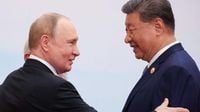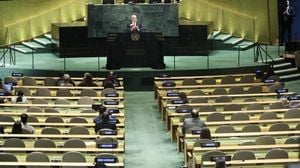In a development stirring concern across global capitals, Russia has deepened its military partnership with China, providing advanced weaponry and specialized training in a move analysts say could tip the regional balance and sharpen Beijing’s readiness for a potential conflict over Taiwan. This collaboration, documented in hundreds of pages of leaked and verified contracts, marks a new phase in the already robust relationship between Moscow and Beijing, with implications stretching far beyond Asia’s shores.
According to The Washington Post, as cited by FOKUS and confirmed by the British Royal United Services Institute (RUSI), Russia has agreed to help China prepare for a possible attack on Taiwan by supplying military hardware and conducting large-scale training exercises for Chinese airborne troops. These revelations stem from documents reviewed by RUSI and leaked by the Black Moon hacktivist group, which detail the contours of a deal that is as strategic as it is substantial.
Under the agreement, finalized in 2023 and expanded upon in October 2024, Russia will sell China’s People’s Liberation Army (PLA) a suite of advanced military equipment. The package includes 37 BMD-4M light amphibious transport vehicles, 11 Sprut-SDM1 self-propelled anti-tank guns, and 11 BTR-MDM airborne armored personnel carriers. The contract also covers the delivery of command and observation vehicles and special parachute systems designed to drop heavy loads from high altitudes. In addition, the vehicles are to be equipped with Chinese communications and command-and-control suites, ensuring seamless integration with PLA systems. The weapons themselves are being adapted to be compatible with Chinese software, electronic, radio, and navigation systems, the documents show.
But the deal is not just about hardware. It includes the training of a Chinese airborne battalion by Russian instructors—an area where Moscow’s military, with its extensive combat experience, maintains a distinct edge over Beijing. RUSI’s review of the documents highlights that Russian instructors will conduct training both in Russia and at Chinese training grounds, preparing Chinese paratroopers for landing operations, fire control, and maneuvering. The training programs also cover the combat use of weapons and the command and control systems used to guide operations, providing Chinese forces with critical know-how for rapid deployment and potential offensive actions.
“Russia is equipping and training Chinese special forces groups to penetrate the territory of other countries without being noticed, offering offensive options against Taiwan, the Philippines and other island states in the region,” wrote RUSI fellows Oleksandr V Danylyuk and Jack Watling in their analysis of the deal, as reported by CNN. This assessment underscores the strategic intent behind the partnership: to enhance China’s air maneuver capabilities, one of the few areas where Russia’s military still outpaces the PLA. Such capabilities could prove decisive in any future attempt by China to seize Taiwan, the self-governing island of 23 million that Beijing claims as its own.
The documents reviewed by RUSI also reveal several rounds of high-level negotiations, including a key meeting in Beijing in April 2024, during which Chinese officials pressed Russia to accelerate the delivery of certain transport vehicles. Separate documents outline technology transfer provisions, allowing China to eventually manufacture similar weapons domestically—a move that could significantly boost China’s indigenous military production in the years ahead.
Jack Watling, a senior fellow for land warfare at RUSI, emphasized the broader implications: “In a future war for Taiwan, Moscow’s supplies of oil, gas and other natural resources, as well as its large defense industry, could become a ‘strategic reserve for China.’” This potential for Russia to act as a logistical and industrial backstop for Beijing adds another layer of complexity to the evolving security landscape in Asia.
While the documents paint a detailed picture of the agreement’s scope, it remains unclear whether the deal has been fully implemented. CNN has not independently reviewed the leaked materials and has reached out to China’s Ministry of National Defense and Russia’s defense ministry for comment. Nonetheless, the mere existence of such a plan has already set off alarm bells in Washington and other allied capitals, where the prospect of a more capable and coordinated Sino-Russian military axis is viewed with deep unease.
The timing of the deal is notable. Russia and China have a long history of arms trade dating back to the 1990s, but the past decade has seen their military partnership flourish amid warming ties between Russian President Vladimir Putin and Chinese leader Xi Jinping. This relationship has only grown more pronounced since Moscow’s full-scale invasion of Ukraine in 2022, which led Russia to pivot away from Europe and toward China as its primary economic and strategic partner. Earlier this month, Putin described the bilateral relationship as being at an “unprecedentedly high level,” and the two countries reportedly finalized a major new pipeline agreement to send Russian natural gas to China via Mongolia.
Beyond bilateral arms deals, Russia and China have dramatically ramped up their joint military activities. According to the Center for Strategic and International Studies, the two nations conducted 14 joint military drills in 2024 alone—the highest number since they began such exercises in 2003. These have included joint naval patrols around Japan, air and sea patrols off Alaska, and, notably, their first-ever joint submarine patrol in the Pacific. In August 2025, Xi, Putin, and North Korean leader Kim Jong Un stood together at a military parade in Beijing, signaling a rare show of solidarity against the United States and its allies.
The partnership’s regional implications are already being felt, particularly in the South China Sea, where China and the Philippines have overlapping territorial claims. Vessels from both countries regularly clash in these contested waters, and the enhanced capabilities of China’s airborne forces could further embolden Beijing’s assertiveness in the region, raising the stakes for neighboring states and the broader international community.
For China, the greatest benefit of the 2023 deal, according to RUSI experts, lies in the training of its airborne battalion. While the PLA has made significant strides in modernization, Russian forces bring invaluable combat experience, particularly in rapid-deployment and air maneuver operations. Should China ever attempt to take Taiwan, an air assault—getting key troops and equipment onto the island quickly—would likely be central to its strategy, though any such operation would still face formidable logistical and military challenges.
As the world watches the evolving Moscow-Beijing axis, the contours of this latest military agreement offer a window into the shifting dynamics of global power. With Russia and China drawing ever closer—on the battlefield, in the marketplace, and at the negotiating table—the stakes for peace and security in Asia, and beyond, have rarely been higher.




